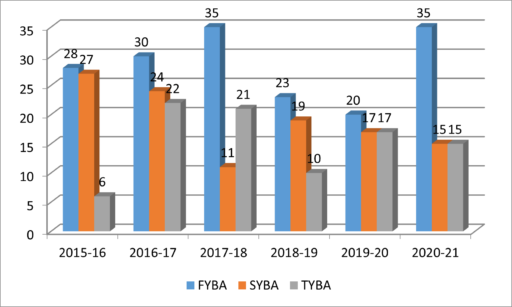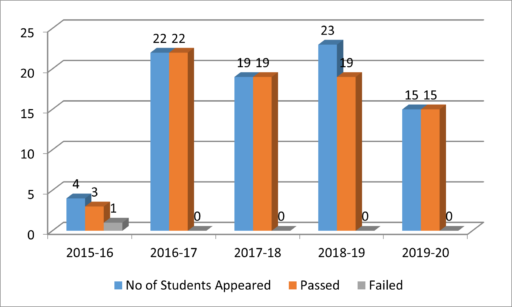Department of Economics
Department of Economics
About the Department
The department in the college got established in 1990. The department is also aimed to enable the students to have an understanding of the various issues of the Indian Economy and to equip them with core values needed to live as a responsible citizen in a complex democratic society. The department is also aimed at imparting Knowledge and skill to develop analyzing capability in applying economic theories to real life situation. In all the three years of undergraduation, economics is offered at optional level. Various aspects related to Indian economy are covered in all the three years. The papers like Banking help the students to get practical knowledge and use it in day to day life.
Student Stength
| Name of the Course/programme | Selected |
|---|---|
| FYBA(Gen) | 40 |
| SYBA(Gen) | 13 |
| TYBA(Gen) | 24 |
Faculty of Department
| Sr.No. | Name | Qualification | Email-ID | Contact No. |
|---|---|---|---|---|
| 1 | Mrs.M.V.Chaudhari | M.A.,B.Ed. | manichaudhari70@gmail.com | 9423315846 |
University Rank Holders
| Sr. No | Name of the Student | Exam | Year | College Rank |
|---|---|---|---|---|
| 1 | More Tirona T. | TYBA | 2014-15 | Ist |
| 2 | Jaware Pratibha | TYBA | 2014-15 | IInd |
| 3 | Sonawane Bijali Subhash | TYBA | 2015-16 | Ist |
| 4 | More Dhanashri Arun | TYBA | 2015-16 | IInd |
| 5 | Ahire Yogita Bhagwan | TYBA | 2016-17 | Ist |
| 6 | Jadhav Bhatabai | TYBA | 2016-17 | IInd |
Publications
| SR.NO | TITTLE OF PAPER | YEAR OF PUBLICATION | PUBLISHER |
|---|---|---|---|
| 1 | WOMEN INDEPENDENS REALITY | NOV.2011 | आदर पब्लिकेशन, अमरावती |
| 2 | THE EFFECT OF BLACK MONEY ON THE INDIAN ECONOMY | OCT.2012 | MAITRI PRAKASHAN, LATUR |
| 3 | डॉ. आंबेडकर यांचे भारतीय चलन आणि बिल विषयक दृष्टीकोन | JAN .2013 | आदर पब्लिकेशन, अमरावती |
| 4 | GANDHIAN THOUGTHS AND MODERN WOMEN (ECONOMIC SOLUTION) | MARCH. 2013 | संशोधन क्रांती |
| 5 | विदेशी गुंतवणुकीचा भारतीय अर्थव्यवस्थेवरील परिणाम | NOV. 2013 | संशोधन क्रांती |
| 6 | संशोधनाचे प्रकार | FEB .2014 | अथर्व पब्लिकेशन |
Events and activities
During the Academic year the department organized various curricular and co-curricular activities for students.
- National Population Day Celebrated On 11th July.
- Speech on Changing Trends in the Banking Sector.
- Student Bank Visit.
- Revenue(महसूल ) Week 1 to 7 August
- Speech on cashless system
Faculty Contribution
Presented and Publish Research Papers
- 17 September 2016 “Research Guru” Volume-10 Issue
- Online Paper Published On “Economical Enviroment And India”(ISSN:2349-226X)
- Attended 40th National Annual Session For Marathi Economical Conferce on 6,7 & 8th November 2016 Held at Jain Mahavidyalaya. Research paper presented on “LPG & Farming Stuff Marketing, Storage and Transporting” at Chandwad. (ISBN:978-93-24457-02-2)
- Paper Presented on “Number System”Under National Conferenceon 15th to 16th December 2016 in Karmavir Ramravaji Ahir Arts,Commerce & Science Collage Devala,Dist-Nashik.(UGC ,ISBN:978-93-8507-03-1)
- Paper Published on “Effect of Tourism Field On Indian Economical System”subject in(International Research Journal) “Tourism Spl.Edition”(Jan to March 2017)in Quarterly “Financial Communication” of Marathi Economical Conference.(ISSN:0973-8452)
Conferences/ Workshops /Seminars Attended/Presented/Papers Published
Year | Conference | Seminar | Workshop | Total | |||
International | National | International | National | National | University | ||
2014-15 | 02 | – | – | 01 | – | 02 | 04 |
2015-16 | 02 | – | – | 01 | – | 01 | 04 |
2016-17 | 01 | – | – | – | 01 | 02 | 04 |
Year of Establishment: 1990
Mission:
The mission of Department of Economics is to achieve excellence in the teaching of graduate students, the generation of new knowledge through research and scholarship, and the provision of service to the university, local region state nation and international communities.
Goal
To provide excellent education in the basics of Economics to our graduates.
Objectives:
- Introduced the students to the basic principles of microeconomic theory.
- To introduce the student’s behavior of consumer, producer in Economy, Price determination in market and also factor pricing.
- How to microeconomic concepts can be applied to analyze real life situations.
- Introduced the students to the basic principles of micro
- To introduce the student’s behavior of consumer, producer in Economy, Price determination in market and also factor pricing.
- How to micro-economic concepts can be applied to analyze real life situations.
Preface:
Along with the Science & Technology, Literature and Languages, there is a need of economics as well, which supports and satisfy the needs of all other branches of academics. Not only ECO, but studied of economics is helping in policy formulation for betterment of the society. In changing and dynamic environment it became indispensible to understand and study the effect of globalization on the social system and the foreseeable challenges arising from the social, political, cultural and economic conditions. Economics not only create awareness among the generation about rising problems in society, of society and for society but also provide the solution to the problems. The department of Economics was established in 1990.
Courses and Syllabus
- Y.B.A. – Economics of Maharashtra since reform era I and II
- Y.B.A. Indian Economy Part I 1980
- Y.B.A. Indian Economy Part II 1980
Programmes/Courses Offered
- UG (B.A. Economics General)
Courses and Syllabus Details
Level | Course | Pattern | Subject Code | Title of Paper |
UG |
FYBA | Semester 60+40 (CBCS) | ECO-101&201 | Economics of Maharashtra since reform era I and II |
SYBA | Semester 60+40 | ECO-231&241 | Indian Economy Part I 1980 | |
TYBA | Semester 60+40 | ECO-351&361 | Indian Economy Part II 1980 | |
UG | TYBA | Semester 60+40 | ECO 355 & 365 | Generic Elective GE |
Number of Teaching Posts
Position | Sanctioned | Filled |
Professor | 00 | 00 |
Associate Professor | 00 | 00 |
Assistant Professor | 01 | 01 |
Profile of Teachers
Name | Qualification | Designation | Specialization | Experience (Years) | Link to Personal Profile |
Prof. Manisha Vasudeo Chaudhari Chaudhari | MA, B. Ed. Ph.D.(perusing ) | Assistant Professor | Economics | 24 yrs |
|
Teaching Workload (2018-19)
Courses | Undergraduate | Postgraduate | Total |
Workload | 12 | 00 | 12 |
Distribution of Workload
Name of Faculty | Undergraduate | Postgraduate | Total |
Prof. Manisha Vasudeo Chaudhari Chaudhari | 12 | 00 | 12 |
Student of Economy (2014-15 to 2019-20)
Year | 2015-16 | 2016-17 | 2017-18 | 2018-19 | 2019-20 | 2020-21 |
FYBA | 28 | 30 | 35 | 23 | 20 | 35 |
SYBA | 27 | 24 | 11 | 19 | 17 | 15 |
TYBA | 06 | 22 | 21 | 10 | 17 | 15 |
TYBA |
|
|
|
|
| 13 |
Student of Economics- Graph (2015-16 to 2019-20)

Department Time-Table
Sr. No | Time | Class | Monday | Tuesday | Wedensday | Class | Thursday | Friday | Saturday |
1 | 12.30 to 1.20 |
|
|
|
|
|
|
|
|
2 | 1.20 to 2.10 |
|
|
|
| F.Y.B.A. | GEN-I (MVC) | GEN-I (MVC) | GEN-I (MVC) |
3 | 2.10 to 3.00 |
|
|
|
|
|
|
|
|
Short Recess | |||||||||
| 3.10 to 4.00 | S.Y.B.A. | GEN-II (MVC) | GEN-II (MVC) | GEN-II (MVC) | T.Y.B.A. | GEN-III (MVC) | GEN-III (MVC) | GEN-III (MVC) |
| 4.00 to 4.50 |
|
|
| GEN-I (MVC) | S.Y.B.A. T.Y.B.A | GEN-II (MVC) | GEN-III (MVC) |
|
| 4.50 to 5.40 |
|
|
|
|
|
|
|
|
Student Teacher Ration
UG | PG | Career Oriented Course | ||
Gen. Economics | Special Economics | Certificate | Diploma | |
1:140 | 1:25 | 1:9 | NA | NA |
Department Result (Final Year)
Academic Year | Course/ Programme | No of Students Appeared | Passed | Failed | Result in Percentage |
2015-16 | BA Economics | 4 | 3 | 1 | 75 |
2016-17 | 22 | 22 | 00 | 100 | |
2017-18 | 19 | 19 | 00 | 100 | |
2018-19 | 23 | 19 | 00 | 100 | |
2019-20 | 15 | 15 | 00 | 100 |
Department Result (Final Year) in Graphical Form

Student Enrichment Programmes / Activities
- Classroom seminars, Group Discussions, Speech Presentation
- Guest lecturers for UG
- Cultural Programs- Teacher’s Day, Sari Day,
- World Population Day.
- Cashless Economy
- Consumer Day
- GST and Budget
- Skill Development and employability skills
Data Verification and validation:
Link to Department Activities | 2015-16 | 2016-17 | 2017-18 | 2018-19 | 2019-20 |
Teaching Methods Adopted
- Lecture Methods
- Use of ICT- Power Point Presentations
- Test &Tutorial for internal evaluation
- Seminars
- Practical / Project and Field Visits
- Class / home assignment
- Feedback collection on Syllabi, Faculty, Dept. and Institute
Link to Teaching Methods | 2015-16 | 2016-17 | 2017-18 | 2018-19 | 2019-20 |
Learning Resources / Facilities in the Department:
- Offline Encyclopedia, LAN, Internet for Online Teaching.
- Internet Access: 21 Computers. Also in Computer Lab and Library (20 Computers)
Library Resources Available for Dept. of Economics:
- No. of Library Books : 172 No. of Journals/Periodicals: 00
- No of CDs/DVDs : 00 No. of e-resources: 232
Collaboration with other Institution
- A Memorandum of Understanding (MoU) has been formed with the Saptshrungi multipurpose Institute for women Walwadi Dhule (MS) from the year 2017-18.
Research Publications/Presentations by Faculty Members
Name of Faculty | No of International Journal Publications | No. of National Journal Publications | No. of Books Edited | No.of Books Contributed | Papers Presented | Validation and Verification link (Details) | |
National | International |
| |||||
Manisha Vasudeo Chaudhari | 06 | 13 | 00 | 00 | 13 | 04 |
|
Faculty Members on Professional Bodies and Their Contribution
Prof. Manisha Vasudeo Chaudhari
- Head, Dept. of Economics (Last 23 years up to till Now)
- Worked as Member for College Unit in NAAC Re-Accreditation Process which obtained “A” Grade in March 2015.
- Published over 16 research papers and contributed through National and International Level Journals.
- Member Marathi Economics Council Life Member
SWOC Analysis of the Department: Economics :
Strength
- Department organizes several student centered curricular, co-curricular, extra-curricular and extension activities for their professional grooming.
- Big contribution of students in College Gatherings, NSS activities, College magazine contribution, etc.
- Good number of books in College library.
- Fully qualified faculty for UG and PG
Weakness:
- Less of students’ participation from rural area in dept. events due to time limits.
- Need of more teaching faculty in proportion students’ enrollment.
- Women’s College, hence limitations to stay on campus for long time.
- Lack of separate ICT class for organizing lectures and events.
Opportunity:
- Chances to develop a training and placement center or finishing school to increase rate of employment.
Challenges:
- Rural intake of students fails to respond dept. activities.
- Increase in drop outs at final year degree since marriage becomes a hurdle.
- Need of increase in ICT for all classes
Future Plans of the Department:
- To concentrate upon introducing more skill development courses
- To start departmental library and increase e-access to several resources
- To get associated/ clubbed with national/ international universities/ agencies
- To increase students’ participation at institutional and social responsibilities
- To enable students, strengthen their placement competency.
- To help tribal and rural students avail more job opportunities.

